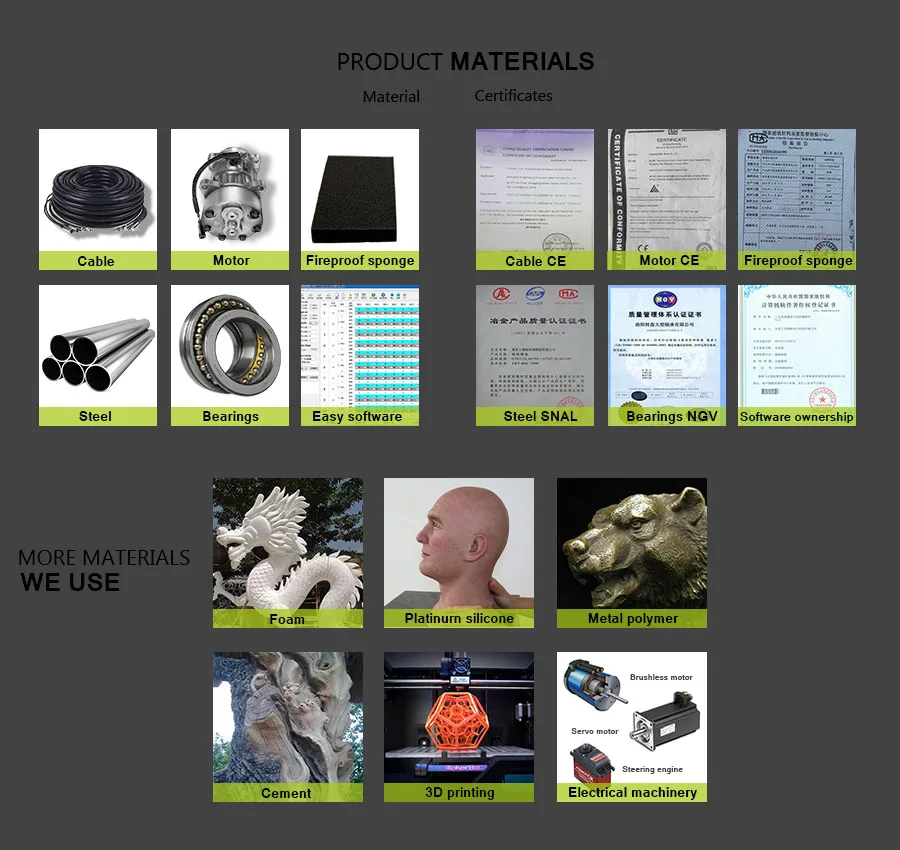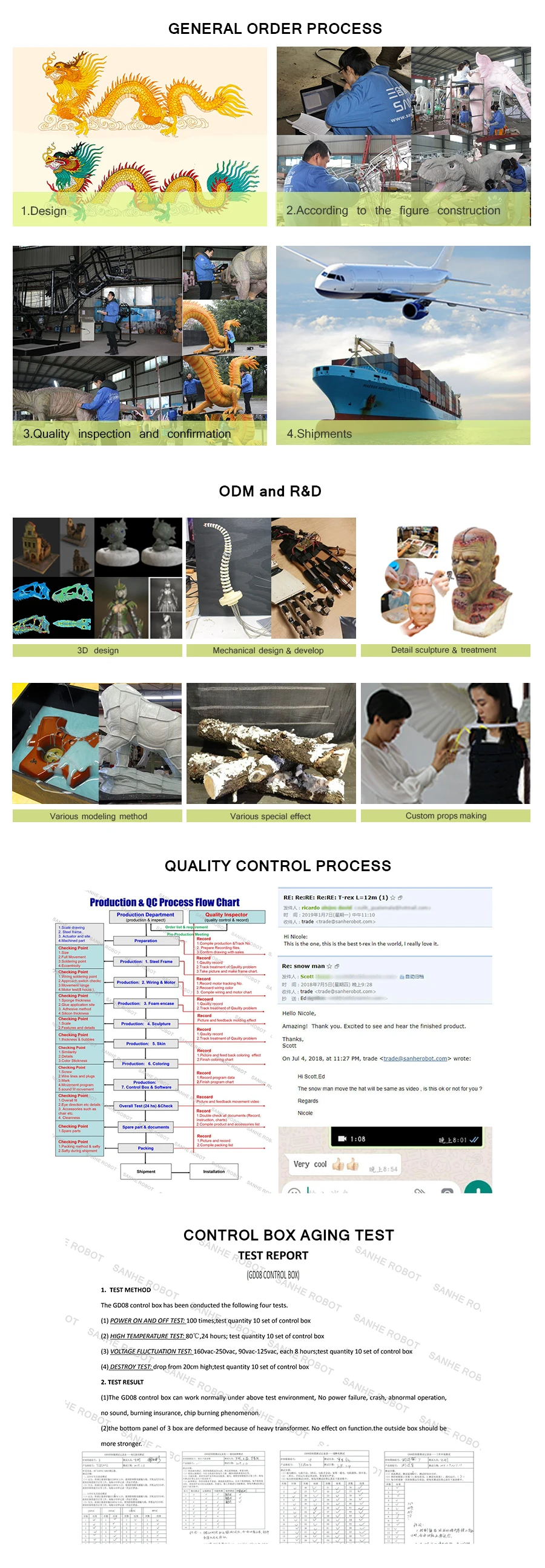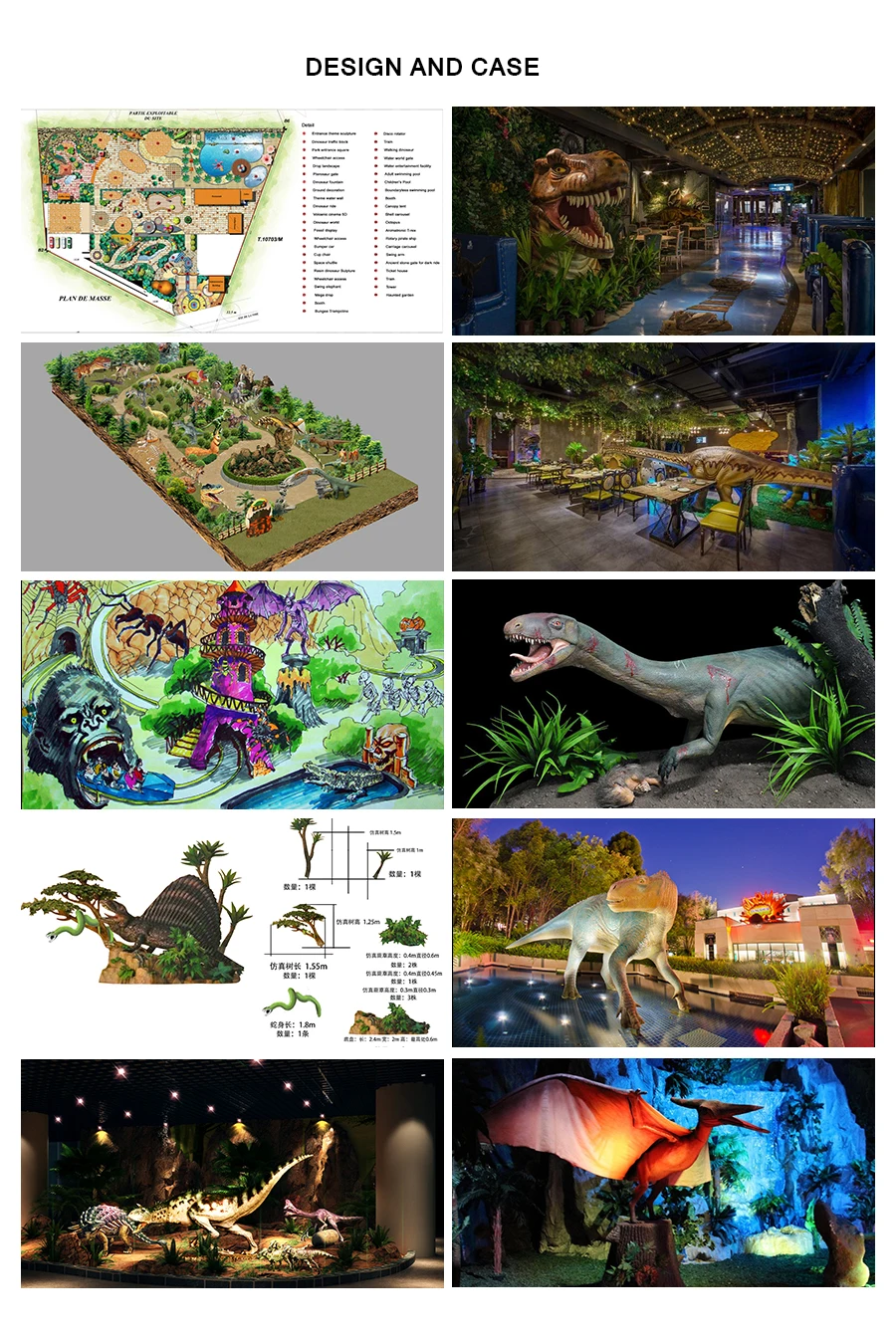Factory price life-size robotic Titanis fight with Hipparion for forest park decoration


MORE INFORMATION
| Input | AC 110/220V ,50-60HZ |
| Plug | Euro plug / British Standard / SAA / C-UL / or depends on request |
| Control mode | Automatic / Infrared / remote / coin / Button / Voice / Touch / Temperature / shooting etc. |
| Waterproofing grade | IP66 |
| Working condition | Sunshine, rain, seaside, 0~50℃(32℉~82℉) |
| Optional function | Sound can be increased to 128 kinds Smoke,/ water. / bleed / smell / change color / change lights / LED screen etc interactive(Location tracking) / conversine(currently only Chinese) |
AFTER-SALE SERVICE
| Service | Need be cut for shipping,fwill provide a detailed installation manual. |
| Warranty | We provide 2 years warranty for all of our antrimatronic models, the warranty pieriod starts from freight arrives at destination port. Our warranty covers motor, reducer, control box, etc. |






 Animatronic animal life-size animal lifelike animal
animatronic sculpture theme park robotic animal artificial animal lifesize animal simulation robot animals indoor playground equipment for sale zoo park animatronic animal outdoor playground playground equipment zoo exhibition outdoor animals artificial animal model artificial animal sculpture outdoor playground animatronic animals exhibition robot life size artificial animal lifelike animal model
Titanis is an extinct genus of giant flightless terror birds that inhabited North America during the early Pliocene to early Pleistocene epochs. The generic name, Titanis, refers to the titans, Ancient Greek gods that preceded the Twelve Olympians, in allusion to the bird's size. The specific name, T. walleri, honors the holotype's collector, Benjamin I. Waller, an avocational underwater archaeologist. Titanis was thought to be carnivorous and most likely preyed on the many small mammals of the time period. This giant flightless bird was one of the most efficient predators of its time in North America.
Hipparion (Greek, "pony") is an extinct genus of horse that lived in North America, Asia, Europe, and Africa during the Miocene through Pleistocene ~23 Mya—781,000 years ago. It lived in non-forested, grassy plains, shortgrass prairie or steppes.
Hipparion resembled the modern horse, but still had two vestigial outer toes (in addition to its hoof). In some species, these outer toes were functional. Hipparion was about 1.4 metres (4.6 ft) tall at the shoulder
Titanis was approximately 1.4 to 1.9 meters (4.6 to 6.2 ft) tall and around 150 kilograms (330 lb) in weight. When compared with other phorusrhacids, the examined material indicates a large variation in the size of Titanis, perhaps indicating strong sexual dimorphism. It had long, agile legs, and three-toed feet with long talons. It could undoubtedly run at high speeds when hunting. Though its skull has not been found, it most probably would have been large, with a huge, axe-like beak, like its relatives.
Overall, Titanis was very similar to the South American Phorusrhacos and Devincenzia, its closest relatives. However, it differs from these in having a shorter, thicker neck, and an overall more heavily built bodily structure. Little is known of its body structure, but it seems to have been less wide-footed than Devincenzia, with a proportionally much stronger middle toe
Animatronic animal life-size animal lifelike animal
animatronic sculpture theme park robotic animal artificial animal lifesize animal simulation robot animals indoor playground equipment for sale zoo park animatronic animal outdoor playground playground equipment zoo exhibition outdoor animals artificial animal model artificial animal sculpture outdoor playground animatronic animals exhibition robot life size artificial animal lifelike animal model
Titanis is an extinct genus of giant flightless terror birds that inhabited North America during the early Pliocene to early Pleistocene epochs. The generic name, Titanis, refers to the titans, Ancient Greek gods that preceded the Twelve Olympians, in allusion to the bird's size. The specific name, T. walleri, honors the holotype's collector, Benjamin I. Waller, an avocational underwater archaeologist. Titanis was thought to be carnivorous and most likely preyed on the many small mammals of the time period. This giant flightless bird was one of the most efficient predators of its time in North America.
Hipparion (Greek, "pony") is an extinct genus of horse that lived in North America, Asia, Europe, and Africa during the Miocene through Pleistocene ~23 Mya—781,000 years ago. It lived in non-forested, grassy plains, shortgrass prairie or steppes.
Hipparion resembled the modern horse, but still had two vestigial outer toes (in addition to its hoof). In some species, these outer toes were functional. Hipparion was about 1.4 metres (4.6 ft) tall at the shoulder
Titanis was approximately 1.4 to 1.9 meters (4.6 to 6.2 ft) tall and around 150 kilograms (330 lb) in weight. When compared with other phorusrhacids, the examined material indicates a large variation in the size of Titanis, perhaps indicating strong sexual dimorphism. It had long, agile legs, and three-toed feet with long talons. It could undoubtedly run at high speeds when hunting. Though its skull has not been found, it most probably would have been large, with a huge, axe-like beak, like its relatives.
Overall, Titanis was very similar to the South American Phorusrhacos and Devincenzia, its closest relatives. However, it differs from these in having a shorter, thicker neck, and an overall more heavily built bodily structure. Little is known of its body structure, but it seems to have been less wide-footed than Devincenzia, with a proportionally much stronger middle toe

+86-813-2104677

info@sanherobot.com

+86-13990010824

No.13 Huixin Road, Yantan Town, Yantan District, Zigong City, Sichuan Province, China